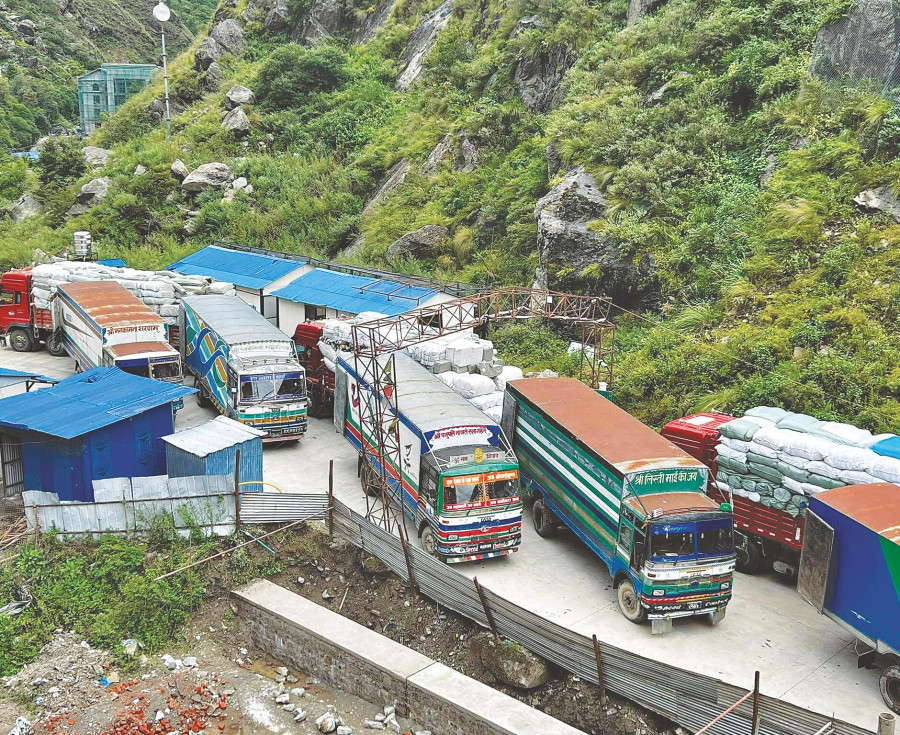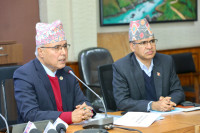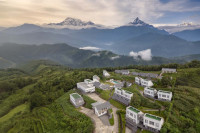Money
China to release all stranded cargo trucks by Sept 27
Nepali traders were frantic they might miss the festival shopping season this year too if their goods did not arrive on time.
Balaram Ghimire
Beijing has ordered Chinese customs authorities to release all Nepal-bound cargo trucks stranded on the Chinese side of the border by September 27, Nepali customs officials said on Thursday.
The overnight development to open the border after keeping it shut for a month over Covid concerns follows the visit of top Chinese politician Li Zhanshu to Nepal.
Li is chairman of the Standing Committee of the National People's Congress and a No 3 member of the Politburo Standing Committee of the Chinese Communist Party, China's top decision-making body.
Arriving in Kathmandu, Li said that he would facilitate the passage of containers stranded on the Chinese side of the border.
China has been imposing a one-way trade rule since the Covid-19 pandemic started in early 2020. Chinese truckers normally deliver the goods ordered by Nepali traders on the Nepal side and return with empty containers. The restriction on exports, however, remains.
During a meeting with Prime Minister Sher Bahadur on Tuesday, Li assured the prime minister that China would reopen the border ports shortly after controlling Covid-19 cases in Tibet while facilitating the passage of containers carrying goods and supplies for the upcoming festivities in Nepal, the Foreign Ministry said in a press statement.
Rasuwagadhi-Kerung and Tatopani-Khasa (Zhangmu) are the two key border crossings between Nepal and China.
Following the order from Beijing, seven cargo trucks rolled into Nepal through the Kerung-Rasuwagadhi transit point on Thursday.
Last month, Beijing announced a strict lockdown in Tibet following a resurgence in Covid-19 infections, preventing goods ordered for the festive season from passing across the border.
China closed the Tatopani border point on August 10 and the second major transit point at Rasuwagadhi on August 14. The border closures came a few days after Nepali Foreign Minister Narayan Khadka's visit to the northern neighbour when the Chinese side had agreed to open it for two-way trade.
The Tatopani border point in Sindhupalchok district was opened on September 10, two days before Li's visit.
Nepali traders, who have been repeatedly calling on the prime minister and other politicians to request China to lift the border restriction ahead of Dashain, say it was a pleasant surprise even though the decision came late.
The Dashain celebrations, Nepal’s biggest festival, begin on September 26.
“Seven cargo trucks carrying readymade goods entered the country on Thursday morning,” said Ram Prasad Mainali, chief customs officer at Rasuwa Customs Office. “Chinese officials observed the border points on Thursday morning to operate it following a new health safety protocol.”
According to Mainali, the Chinese side has informed Nepali authorities that all goods targeted for the festival shopping season that are stranded in different Chinese cities including Shigatse, Kerung, Nyalam and Lhasa, will be released by September 27.
“We will make the necessary arrangements to send the trucks to Kathmandu by following customs and health related protocols.”
Nepali traders were frantic they might miss the festival shopping season this year too like in the past two years when their shipments were held up at the Rasuwagadhi and Tatopani points.
The Dashain and Tihar festival season is a key business event when tens of thousands of Nepalis engage in an annual shopping spree.
Most of the fruits and clothes sold in Kathmandu are imported from China. During Tihar, the festival of lights, the markets are flooded with Chinese twinkle lights and decorations.
Apples, pears, garlic and various other fruits and vegetables imported for the upcoming festive season are rotting in the containers, traders say.
According to Nepali traders, nearly 250 containers laden with merchandise worth billions have been stuck in different cities and roads in Tibet following Beijing’s move to clamp a strict lockdown.
“There are 50 containers loaded with goods in Kerung alone,” said Dharma Poudel, a trader. “We assume that there are around 250 containers stranded in Shigatse, Kerung, Nyalam and Lhasa.”
Naba Raj Jaisi, chief district officer of Rasuwa, said Chinese authorities had communicated that they were ready to send cargo trucks 24/7 in order to clear the backlog.
According to the Department of Customs, Nepal’s imports from China increased by 13.19 percent in the last fiscal year ended mid-July. The country imported goods worth Rs264.78 billion. Exports from Nepal to China plunged by 25 percent to Rs808.75 million in the last fiscal year from Rs1 billion in the previous fiscal year.
Min Bahadur Shrestha, immediate past vice-president of the Nepal Trans Himalayan Border Commerce Association, lauded the government’s move.
“The traders will miss a lot of sales if the goods imported for the festivals are not transported on time,” he said. “Traders have a hard time paying interest on their loans when their goods are not delivered on time.”
The Tatopani-Khasa border point re-opened on May 29, 2019 after remaining closed for four years following the 2015 earthquakes. The border point was a major overland route for trade with the northern neighbour.
China again closed the border points after the pandemic in January 2020, and they have not been fully operationalised since.
The closure of the Chinese border in early 2020 has affected a large number of Nepali entrepreneurs exporting goods to China. The Kerung and Tatopani border points have been re-opened, but neither export nor import trade has picked up.
The Rasuwagadhi-Kerung customs point, which was elevated to an international checkpoint between Nepal and China allowing people from third countries to cross the border, re-opened in July 2020.




 20.12°C Kathmandu
20.12°C Kathmandu















